Betsy Rives (’08) grew up surrounded by paints, markers and crayons, all the usual creative tools for kids. But, through her parents, Rives also learned that creativity could extend beyond a drawing or painting and into everyday experiences.
“Anything could be what we would call an adventure,” Rives says. “And an adventure could be as simple as taking a different route somewhere and timing it and seeing if it was faster or slower. It was rooted in traditional scientific inquiry. But, at the base of it, it was, ‘Let’s just have fun and see what happens and see what we can learn.’”
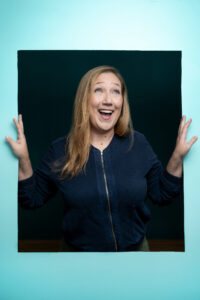
Betsy Rives (’08) performs above in the “Welcome to Colonel” podcast; once an art major, she now works as a Google innovator. Photos courtesy of Rives
Like those unconventional paths home, Betsy’s own career has taken circuitous routes to get to her current destination. She is an insights and innovation manager at Google, a unit of Alphabet Inc., based in Mountain View, California, where she considers new approaches to how we work — online and in the office — to better align them with people’s changing expectations and technology’s expanding potential.
Rives’ own roadmap includes a major in studio art at Wake Forest; a master of fine arts from the Massachusetts College of Art and Design; and an MBA from Yale (University) School of Management. At each stop, she honed a desire to experiment with new ideas and think outside the box — whether it was critiquing art or building on her problem-solving skills in the corporate world.
“Sometimes, when people hear what Betsy is doing now, and they maybe just knew her as the art major, … they don’t always get the connection on how she went and got an MBA and now is doing what she’s doing,” says her younger sister, Sally Rives (’11). “But it actually makes a lot of sense, because she does have that underlying creative and problem-solving mind. A lot of the work she does is using all of those parts of her brain to think very thoughtfully and creatively.”
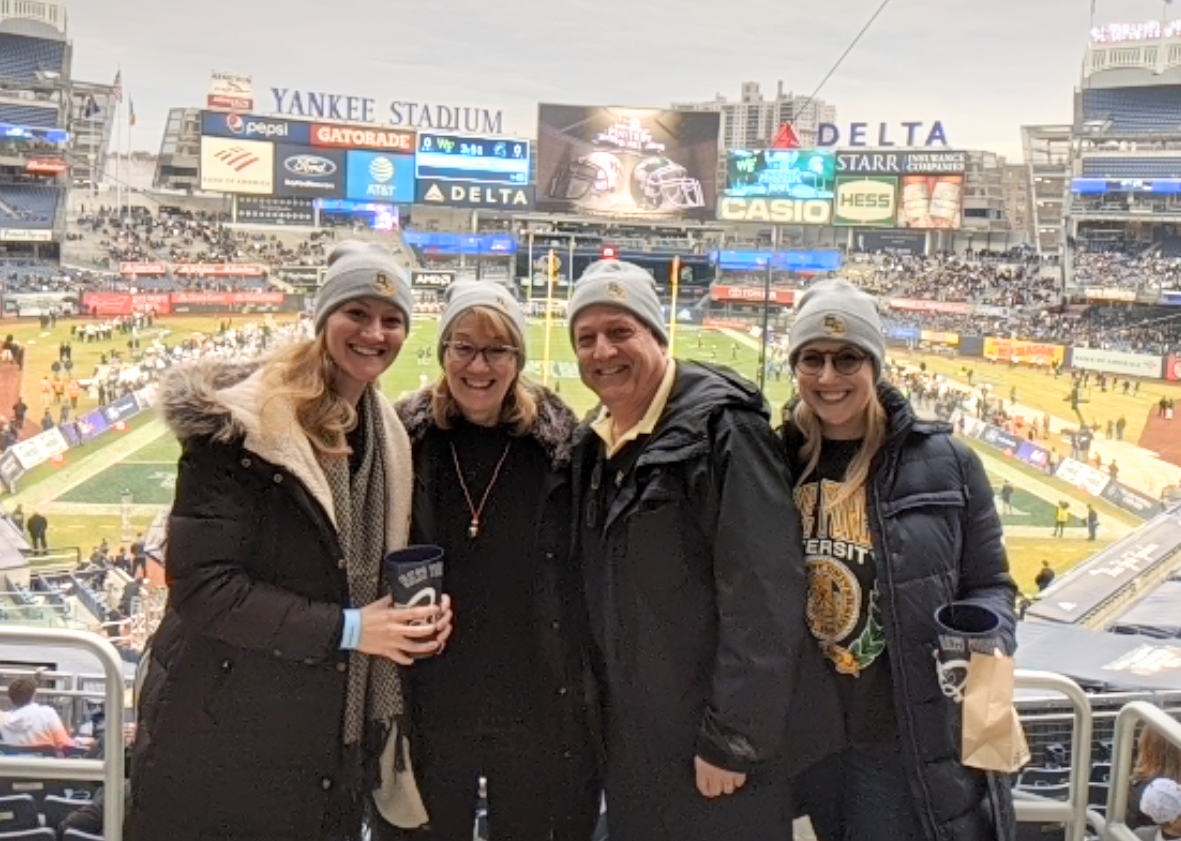
Sally Rives ('11), Katherine Amato (’77, P ’08, ’11), Al Rives (’76, P ’08, ’11) and Betsy Rives went to the Pinstripe Bowl together at Yankee Stadium in 2019.
Free Thinker
Wake Forest was a familiar place for Rives. Along with her younger sister, both her parents attended, and her father taught there — Al Rives (’76, P ’08, ’11), now retired teaching professor of chemistry, and Katherine Amato (’77, P ’08, ’11), executive-in-residence at Duke University’s Pratt School of Engineering.
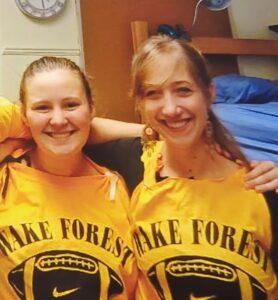
Rives with Johanna Young (’08) in customized shirts
On campus, surrounded by a close group of friends, Rives stood out as a free thinker and creator. She was the one who would rally a group of bleary-eyed college students to wake up before dawn to see the sunrise, remember friends Sarah Tullis Nawrocki (’08, MSA ’09) and Johanna Young (’08).
And Rives was the one with dried paint on her hands and some project in the works — painting in the studio, sewing a quilt or restyling a Wake Forest T-shirt to wear to a football game. “She was always looking at something and finding a different way to make it her own.” Young says.
The close-knit art department, in particular, felt like home to Rives. There, professors gave her the freedom to experiment. She helped create the now shuttered 4th Dimension Gallery in Winston-Salem, featuring art from local university students. “Nowhere else would faculty look at some 18-year-olds, who barely know how to function, and say, ‘Here, manage the space downtown,’” she says.
Professors also taught her how to critique, a mainstay of Wake Forest’s arts program, she says. Rives learned how to communicate clearly about what’s working and not working in others’ pieces in a way that helped them move a project forward. It’s a skill that’s proved valuable as she breaks down elements of a work of art or now, a large organizational problem.
“I really took for granted how unique a skill set that is, and how unique of a skill set it is to listen, as the person who’s being critiqued, and just sit back and not be defensive and try and hear feedback,” she says. “There’s a big empathy component to the art education world.”
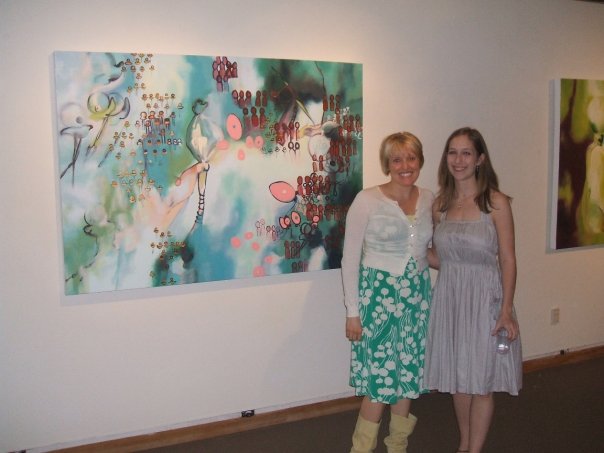
Teaching Professor Jennifer Gentry ('97) and Rives at her senior Honors in Art show with one of her paintings
New Creative Spaces
After Wake Forest, Rives juggled a few jobs before earning her MFA from MassArt, where she dabbled in various creative endeavors, including painting, video, sound, performance and writing. She then worked as an education program coordinator at the Los Angeles County Museum of Art, where she managed hundreds of docents and designed an online reservation system that increased school tour attendance.
That experience built on an interest in how data and technology can inform change, and it eventually led her to Yale to earn an MBA. At first, Rives attempted to follow the conventional MBA path to a traditional management consulting career; it wasn’t a fit. “Accounting is not my strong suit,” she says with a laugh.
Yale, however, did introduce her to creative spaces within the business world, and she eventually became a leader of its Design and Innovation Club and connected with Google, where she interned.
“There are all of these consultancies and teams and big organizations around the world that do really creative thinking and use a lot of the creative problem-solving skills that I’ve been cultivating my whole life,” she says. “It was very refreshing to find that corner of Yale and the business world.”
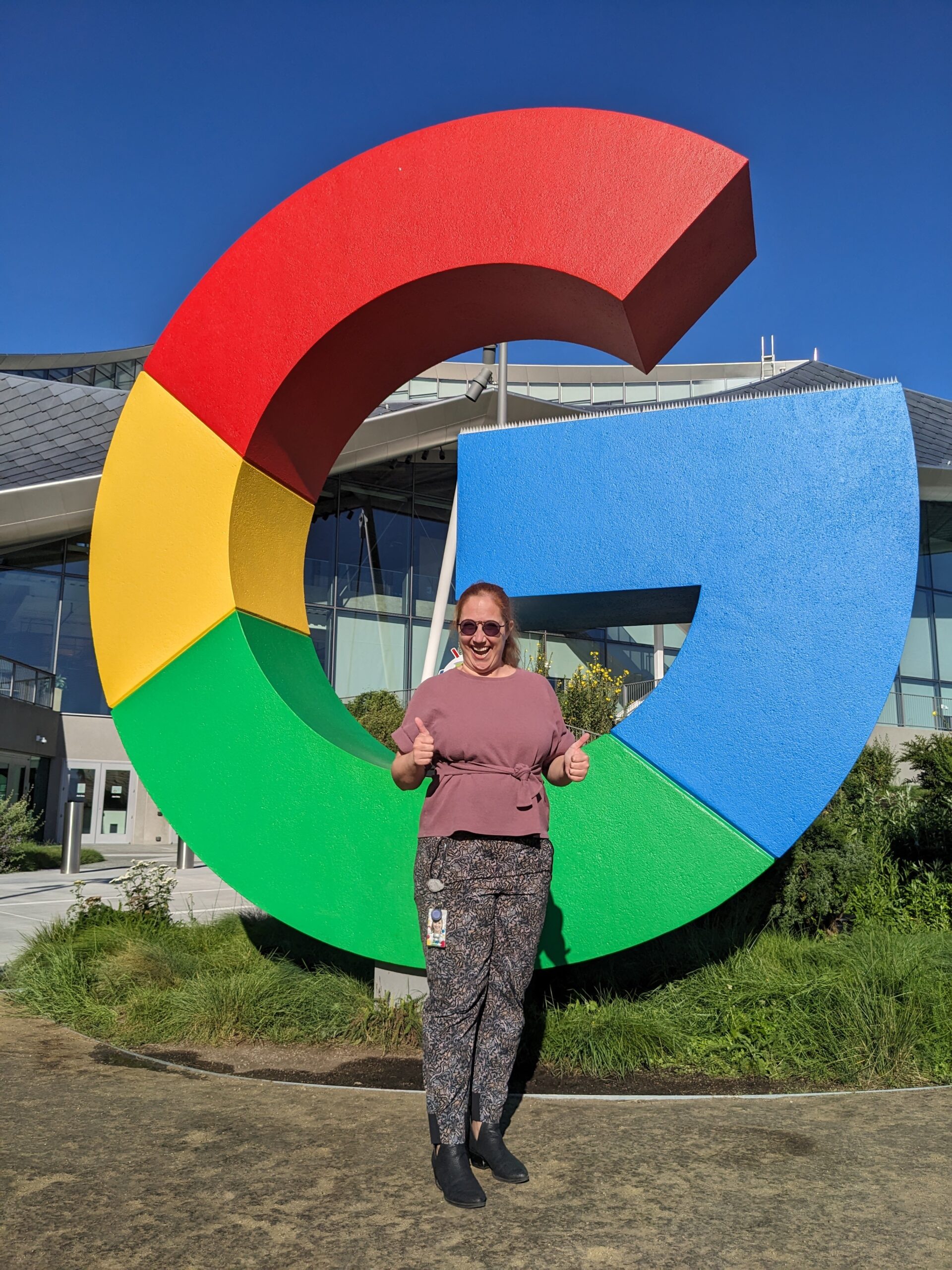
Rives is an insights and innovation manager at Google.
Casting Forward
After graduating from Yale, Rives took a full-time job at Google in 2017, first working in California and later moving to Atlanta. She’s worked in a variety of roles, reimagining with others how Google employees and the rest of us work.
During the pandemic, for example, Rives puzzled over unique challenges as employees worked from home. That included figuring out ways to accommodate people who needed to work in the office for whatever reason — from an unsafe home situation to loud construction next door.
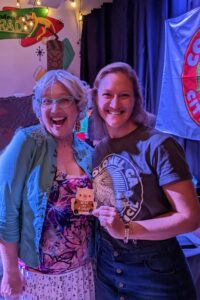
Betsy Rives, in costume as Beverly Lee L’Anderson, for the “Welcome to Colonel” podcast, with her sister Sally Rives
“For people who had extenuating circumstances, how do we get them into the office safely, but also have the privacy so people don’t need to know what’s going on in their home life,” she says.
Now, she’s assigned to the workplace experience group, thinking about how to ensure that workplaces are accessible and welcoming for people with physical disabilities and neurodiversity.
“The two words that we use a lot are empowerment and independence,” she says. “We want everybody to feel fully independent in every space and capable to do anything or take on any challenge, but also empowered to make changes that they need.”
Her daily work includes leading conversations to uncover ideas and solutions. And her ability to critique — honed at Wake Forest — comes into play. She’s often encouraging colleagues to cast out a bunch of ideas and then consider each one to determine what’s worth keeping.
“It’s having conversations, nudging people to think differently and embracing what they say,” Rives says. “It’s a lot of listening and interpreting what you’re hearing. On paper, it doesn’t necessarily look like my art education is applicable day to day, but it is the most applicable thing.”
Next Adventure
Rives is still creative in the traditional sense, too. She makes pottery and jewelry and is involved in standup comedy and improv. She plays a leading role in a podcast called “Welcome to Colonel,” a fully improvised show set in small-town Georgia and, she notes, includes some not-so-family-friendly language.
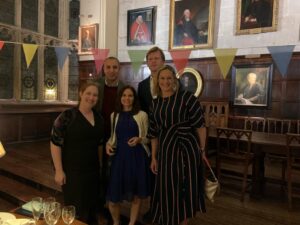
Rives with colleagues in the Oxford Scenarios Programme
With anything she does, “she’s very modest,” sister Sally Rives says. “She’s like, ‘Oh, I’m still learning. I’m not very good.’ And it is always impressive.”
In Betsy Rives’ spare time, she’s often casting her thoughts into the future. She’s taken part in the Oxford Scenarios Programme, an executive education program that considers plausible futures. Earlier this year, she received an Imagination Leadership Award from the Institute for the Future, a nonprofit where participants imagine potential futures to better prepare for them. The award stems from her participation with the institute’s Urgent Optimists group, where members take part in hopeful conversations about the future.
A recent scenario, Rives says, involved considering how we might create a night celebration, which might be prompted at some point in the future by the need to move our working hours to the evening because of a warming climate. Ideas included glowing sidewalks and illuminated clothing. “I find the group challenging in many ways, because my instinct is not optimism,” Rives says.
And she’s always thinking about her next adventure. “Even now, I couldn’t tell you what I want to be when I grow up, which I think is healthy, because I don’t think the jobs that we understand today will be the jobs 10 years from now, which can either be a scary thought or it can be an empowering thought,” she says. “So, I try and be on the empowering side of let’s just learn what we can and be curious about ways that we can engage with change.”
Sarah Lindenfeld Hall is a longtime North Carolina-based journalist, former staff writer for the Winston-Salem Journal and The (Raleigh) News & Observer and founding editor of WRAL-TV’s popular parenting website. Today, she’s a freelance writer, regularly diving into stories about interesting people and parenting, health, education, business and technology topics.


